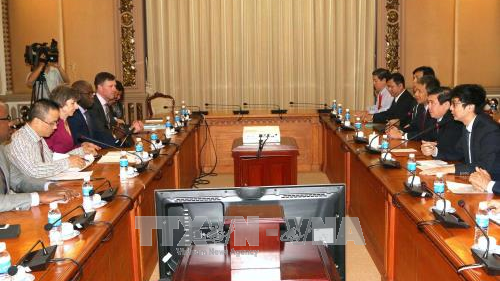Michelin leads the smart mobility revolution with data and AI
Michelin is undergoing a strong transformation by applying AI and smart analytic, helping lead the smart, safe, and sustainable mobility revolution in the Industry 4.0 era.




During the first visit to Vietnam, World Bank Vice President for Sustainable Development, Laura Tuck reaffirmed the World Bank Group’s continued support for Vietnam as the country addresses the challenges of rapid urbanization and the impacts of climate change.

At the meeting with Laura Tuck, Nguyen Thanh Phong, chairman of the people’s committee of Ho Chi Minh City highly appreciates the support of World Bank for the city, especially in funding the key projects to address the problem pollution, raising people’s living standard.
He also expressed his hope to work with World Bank in the coming time to implement the phase 2 of the environmental sanitation program, the green transportation project, etc. The City also desires to co-operate with World Bank in such fields as smart city development, food safety, water loss reduction and some other technical assistance projects.
The World Bank Vice President affirmed that World Bank strongly commit to promote the co-operation opportunities with Ho Chi Minh City, an important partner of World Bank in Vietnam. The World Bank desires and is ready to meet the needs of city leaders in the Development Policy Operation (DPO) programs to support the City's priority development projects.
“Vietnam’s transformation from one of the poorest country to a middle-income country in just three decades is an inspiration to many countries around the world. The World Bank looks forward to continue its close partnership with Vietnam to ensure this growth is inclusive, sustainable and climate-resilient,” said Laura Tuck.
For many years, World Bank has supported Vietnam with many of its funded projects including the Nhieu Loc Thi Nghe canal revitalization project, a transformational project with the City. In her visit to Ho Chi Minh City, Laura Tuck encouraged city authorities to leverage the greater autonomy under the special mechanism recently granted by the central government to the City, focusing primarily on land, investment, and financial management for its development. She also affirmed that a long-term, comprehensive, city-wide and multi-sectoral engagement with the City is a key pillar of the Bank’s urbanization strategy in Vietnam.
She also traversed the Mekong Delta through Ben Tre province to see first-hand the impacts of climate change on the lives, livelihoods, and assets of communities. The Delta is home to more than 17 million people and accounts for about half of Vietnam’s food production, and the region is facing a number of climate-related challenges including coastal erosion and salinity intrusion.
She noted that government agencies and communities can help decide the future of the Delta by making informed choices about how to protect the delta, when to make room for the river, where to let the salt water remain, and when community livelihoods might need to be adjusted in response to changing natural conditions.
Vietnam is moving strongly forward on a more holistic and spatially integrated vision to manage the current and future risks and opportunities in the Delta. The World Bank is helping to identify and prioritize climate-resilient investments and financing the preparation of an integrated regional master plan that will bring together sectors and provinces.
During her meeting with leaders from Can Tho City, Laura Tuck also discussed the role of cities in the transformation of the Mekong Delta, a region with high population density, and the importance of strengthening urban resilience.
Michelin is undergoing a strong transformation by applying AI and smart analytic, helping lead the smart, safe, and sustainable mobility revolution in the Industry 4.0 era.
LG Innotek Vietnam Hai Phong secured a $200 million IFC loan as revenue slows, aiming to expand camera module production while meeting sustainability targets.
For Koen Soenens, Sales and Marketing Director at DEEP C, empathy is a compass that guides major deals, the way a leader builds a team, and the ambition to create a sustainable industrial zone that carries a Vietnamese identity.
Taseco Land has shifted its listing to HOSE and introduced a new upward-pointing arrow logo - a visual statement of its strategy to raise capital, expand its land bank, and strengthen its standing in Vietnam’s real estate sector
Located in the heart of Ho Chi Minh City, SAP Labs Vietnam is the second SAP Labs Network hub in Southeast Asia, following Singapore and is one of 20 countries that have SAP Labs globally.
Solar & Storage Live Vietnam event has been running since 2017 and the 2025 edition will be the biggest yet.